Analyzing Business Cultures: Australia and China Comparison Report
VerifiedAdded on 2023/01/13
|5
|1160
|69
Report
AI Summary
This report provides an analysis of business cultures in Australia and China, focusing on the impact of cultural differences on international business practices. The study uses Hofstede's six cultural dimensions (power distance, individualism vs. collectivism, masculinity vs. femininity, uncertainty avoidance, long-term vs. short-term orientation, and indulgence vs. restraint) to compare the business environments of both countries. The report highlights the low power distance and high individualism in Australia, contrasting with China's higher power distance and collectivist culture. It also discusses differences in attitudes toward uncertainty, long-term orientation, and societal values, offering insights into how these cultural variances influence communication, etiquette, and organizational hierarchy. The findings are supported by references to academic literature and provide a framework for understanding and navigating the complexities of global business operations. This analysis is crucial for anyone looking to engage in international business and adapt strategies to different cultural contexts.
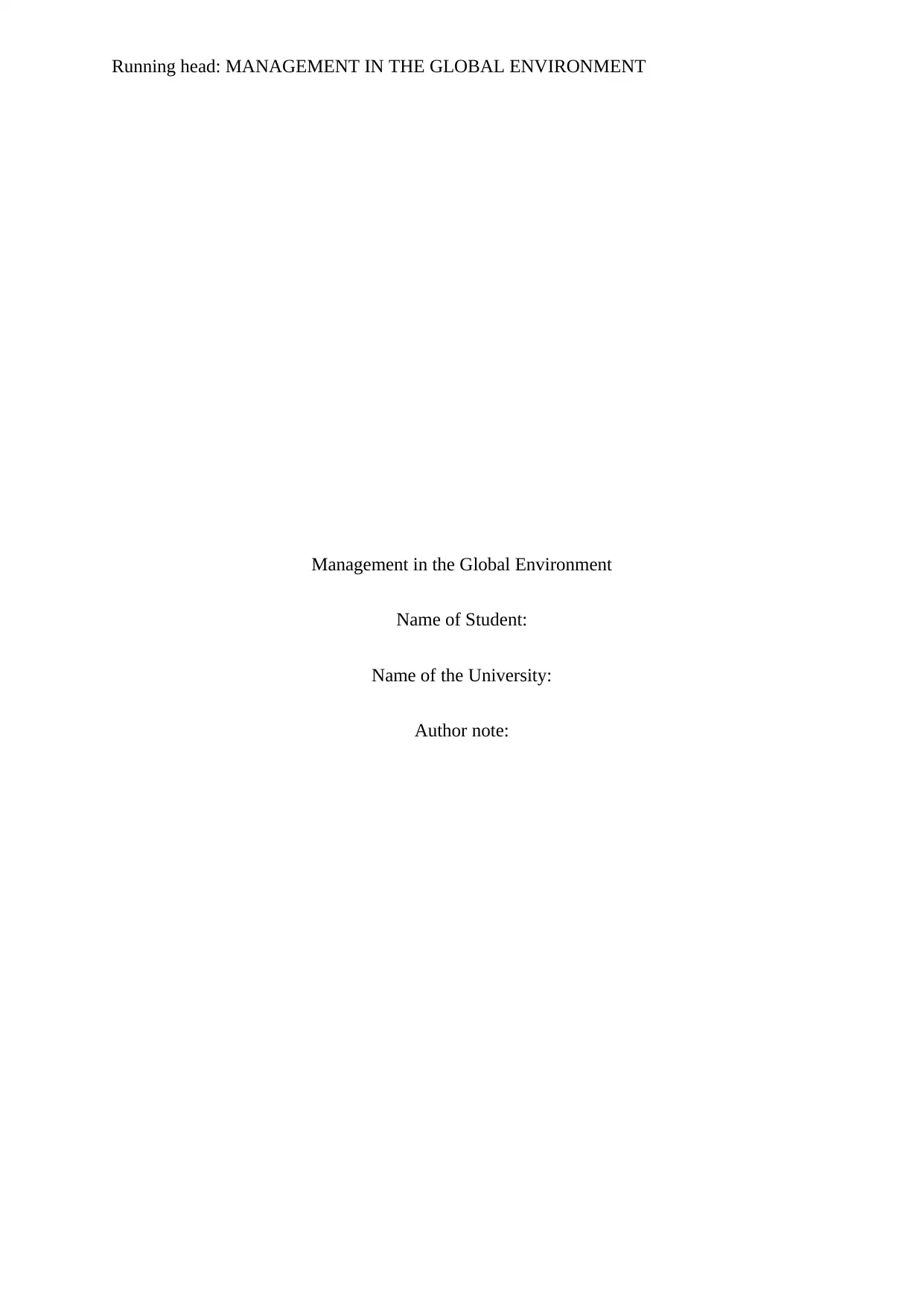
Running head: MANAGEMENT IN THE GLOBAL ENVIRONMENT
Management in the Global Environment
Name of Student:
Name of the University:
Author note:
Management in the Global Environment
Name of Student:
Name of the University:
Author note:
Paraphrase This Document
Need a fresh take? Get an instant paraphrase of this document with our AI Paraphraser
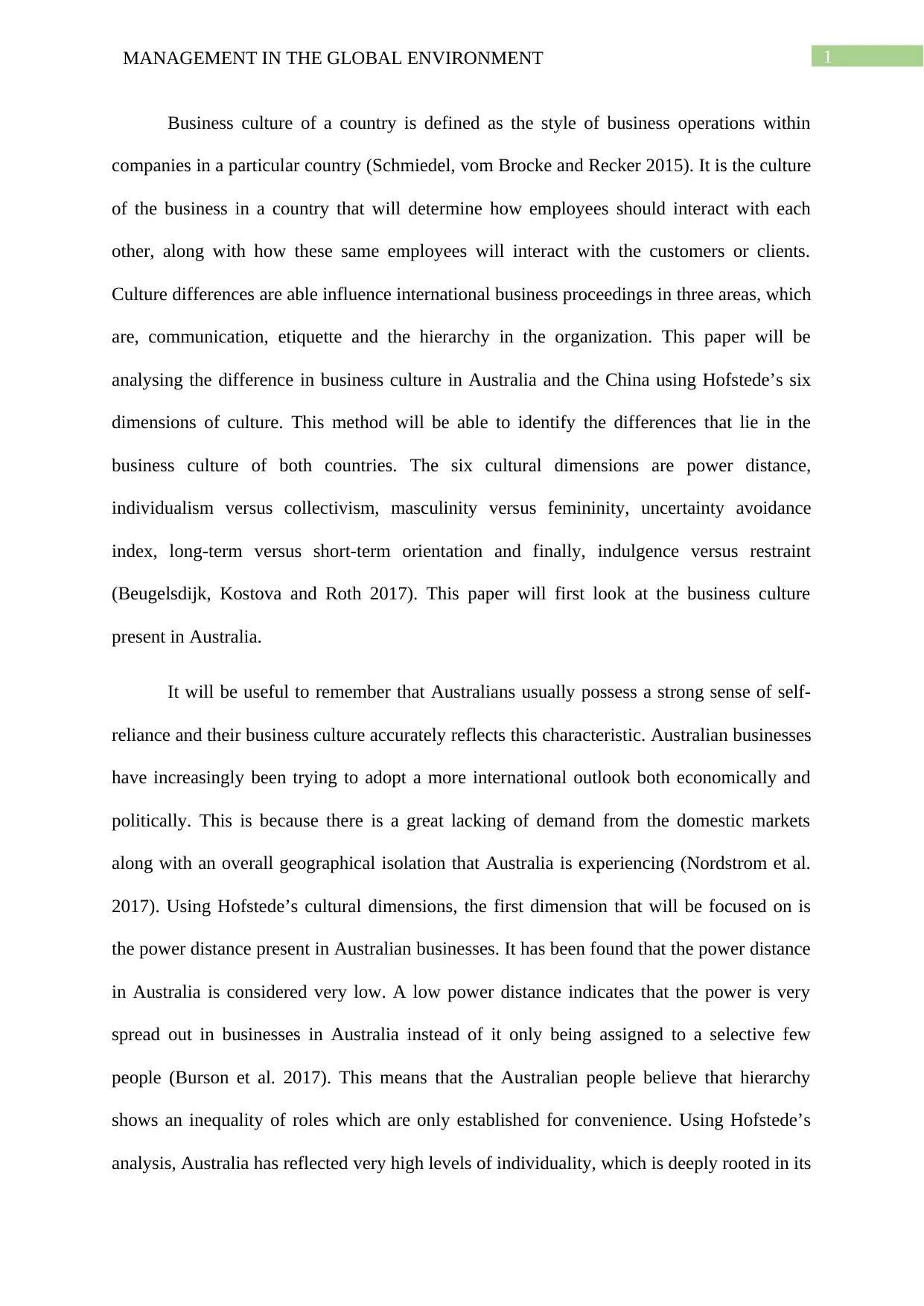
1MANAGEMENT IN THE GLOBAL ENVIRONMENT
Business culture of a country is defined as the style of business operations within
companies in a particular country (Schmiedel, vom Brocke and Recker 2015). It is the culture
of the business in a country that will determine how employees should interact with each
other, along with how these same employees will interact with the customers or clients.
Culture differences are able influence international business proceedings in three areas, which
are, communication, etiquette and the hierarchy in the organization. This paper will be
analysing the difference in business culture in Australia and the China using Hofstede’s six
dimensions of culture. This method will be able to identify the differences that lie in the
business culture of both countries. The six cultural dimensions are power distance,
individualism versus collectivism, masculinity versus femininity, uncertainty avoidance
index, long-term versus short-term orientation and finally, indulgence versus restraint
(Beugelsdijk, Kostova and Roth 2017). This paper will first look at the business culture
present in Australia.
It will be useful to remember that Australians usually possess a strong sense of self-
reliance and their business culture accurately reflects this characteristic. Australian businesses
have increasingly been trying to adopt a more international outlook both economically and
politically. This is because there is a great lacking of demand from the domestic markets
along with an overall geographical isolation that Australia is experiencing (Nordstrom et al.
2017). Using Hofstede’s cultural dimensions, the first dimension that will be focused on is
the power distance present in Australian businesses. It has been found that the power distance
in Australia is considered very low. A low power distance indicates that the power is very
spread out in businesses in Australia instead of it only being assigned to a selective few
people (Burson et al. 2017). This means that the Australian people believe that hierarchy
shows an inequality of roles which are only established for convenience. Using Hofstede’s
analysis, Australia has reflected very high levels of individuality, which is deeply rooted in its
Business culture of a country is defined as the style of business operations within
companies in a particular country (Schmiedel, vom Brocke and Recker 2015). It is the culture
of the business in a country that will determine how employees should interact with each
other, along with how these same employees will interact with the customers or clients.
Culture differences are able influence international business proceedings in three areas, which
are, communication, etiquette and the hierarchy in the organization. This paper will be
analysing the difference in business culture in Australia and the China using Hofstede’s six
dimensions of culture. This method will be able to identify the differences that lie in the
business culture of both countries. The six cultural dimensions are power distance,
individualism versus collectivism, masculinity versus femininity, uncertainty avoidance
index, long-term versus short-term orientation and finally, indulgence versus restraint
(Beugelsdijk, Kostova and Roth 2017). This paper will first look at the business culture
present in Australia.
It will be useful to remember that Australians usually possess a strong sense of self-
reliance and their business culture accurately reflects this characteristic. Australian businesses
have increasingly been trying to adopt a more international outlook both economically and
politically. This is because there is a great lacking of demand from the domestic markets
along with an overall geographical isolation that Australia is experiencing (Nordstrom et al.
2017). Using Hofstede’s cultural dimensions, the first dimension that will be focused on is
the power distance present in Australian businesses. It has been found that the power distance
in Australia is considered very low. A low power distance indicates that the power is very
spread out in businesses in Australia instead of it only being assigned to a selective few
people (Burson et al. 2017). This means that the Australian people believe that hierarchy
shows an inequality of roles which are only established for convenience. Using Hofstede’s
analysis, Australia has reflected very high levels of individuality, which is deeply rooted in its
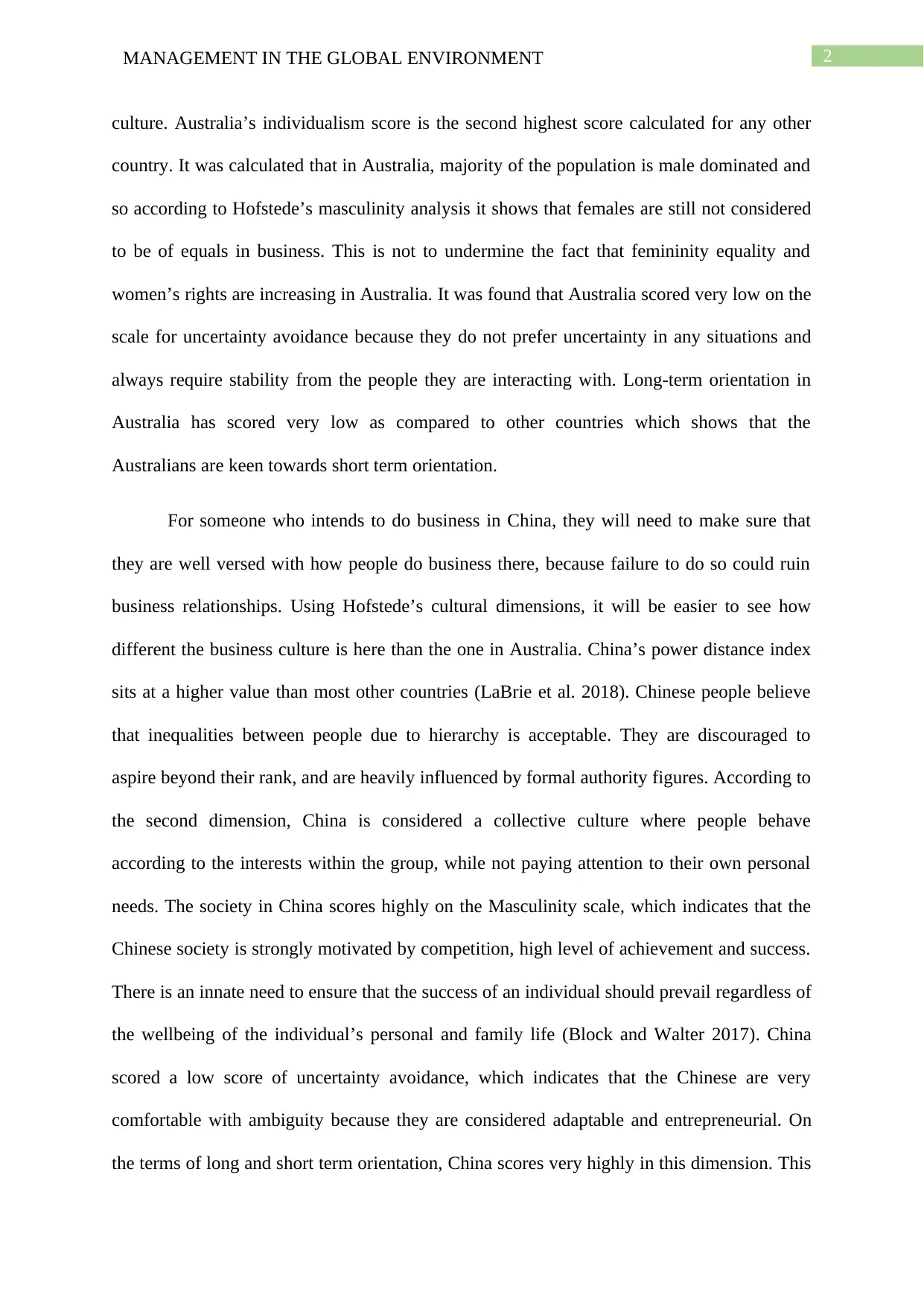
2MANAGEMENT IN THE GLOBAL ENVIRONMENT
culture. Australia’s individualism score is the second highest score calculated for any other
country. It was calculated that in Australia, majority of the population is male dominated and
so according to Hofstede’s masculinity analysis it shows that females are still not considered
to be of equals in business. This is not to undermine the fact that femininity equality and
women’s rights are increasing in Australia. It was found that Australia scored very low on the
scale for uncertainty avoidance because they do not prefer uncertainty in any situations and
always require stability from the people they are interacting with. Long-term orientation in
Australia has scored very low as compared to other countries which shows that the
Australians are keen towards short term orientation.
For someone who intends to do business in China, they will need to make sure that
they are well versed with how people do business there, because failure to do so could ruin
business relationships. Using Hofstede’s cultural dimensions, it will be easier to see how
different the business culture is here than the one in Australia. China’s power distance index
sits at a higher value than most other countries (LaBrie et al. 2018). Chinese people believe
that inequalities between people due to hierarchy is acceptable. They are discouraged to
aspire beyond their rank, and are heavily influenced by formal authority figures. According to
the second dimension, China is considered a collective culture where people behave
according to the interests within the group, while not paying attention to their own personal
needs. The society in China scores highly on the Masculinity scale, which indicates that the
Chinese society is strongly motivated by competition, high level of achievement and success.
There is an innate need to ensure that the success of an individual should prevail regardless of
the wellbeing of the individual’s personal and family life (Block and Walter 2017). China
scored a low score of uncertainty avoidance, which indicates that the Chinese are very
comfortable with ambiguity because they are considered adaptable and entrepreneurial. On
the terms of long and short term orientation, China scores very highly in this dimension. This
culture. Australia’s individualism score is the second highest score calculated for any other
country. It was calculated that in Australia, majority of the population is male dominated and
so according to Hofstede’s masculinity analysis it shows that females are still not considered
to be of equals in business. This is not to undermine the fact that femininity equality and
women’s rights are increasing in Australia. It was found that Australia scored very low on the
scale for uncertainty avoidance because they do not prefer uncertainty in any situations and
always require stability from the people they are interacting with. Long-term orientation in
Australia has scored very low as compared to other countries which shows that the
Australians are keen towards short term orientation.
For someone who intends to do business in China, they will need to make sure that
they are well versed with how people do business there, because failure to do so could ruin
business relationships. Using Hofstede’s cultural dimensions, it will be easier to see how
different the business culture is here than the one in Australia. China’s power distance index
sits at a higher value than most other countries (LaBrie et al. 2018). Chinese people believe
that inequalities between people due to hierarchy is acceptable. They are discouraged to
aspire beyond their rank, and are heavily influenced by formal authority figures. According to
the second dimension, China is considered a collective culture where people behave
according to the interests within the group, while not paying attention to their own personal
needs. The society in China scores highly on the Masculinity scale, which indicates that the
Chinese society is strongly motivated by competition, high level of achievement and success.
There is an innate need to ensure that the success of an individual should prevail regardless of
the wellbeing of the individual’s personal and family life (Block and Walter 2017). China
scored a low score of uncertainty avoidance, which indicates that the Chinese are very
comfortable with ambiguity because they are considered adaptable and entrepreneurial. On
the terms of long and short term orientation, China scores very highly in this dimension. This
⊘ This is a preview!⊘
Do you want full access?
Subscribe today to unlock all pages.

Trusted by 1+ million students worldwide
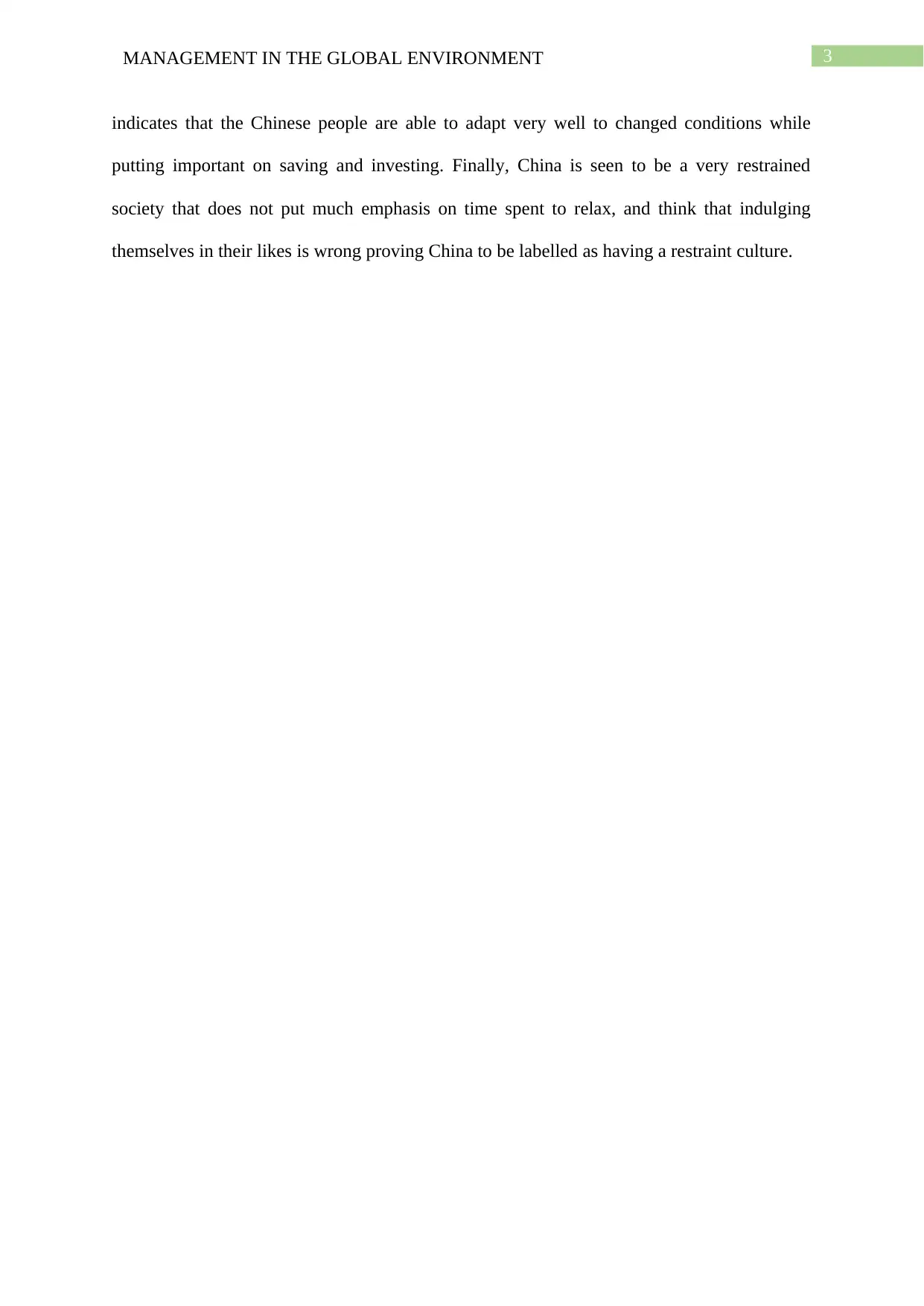
3MANAGEMENT IN THE GLOBAL ENVIRONMENT
indicates that the Chinese people are able to adapt very well to changed conditions while
putting important on saving and investing. Finally, China is seen to be a very restrained
society that does not put much emphasis on time spent to relax, and think that indulging
themselves in their likes is wrong proving China to be labelled as having a restraint culture.
indicates that the Chinese people are able to adapt very well to changed conditions while
putting important on saving and investing. Finally, China is seen to be a very restrained
society that does not put much emphasis on time spent to relax, and think that indulging
themselves in their likes is wrong proving China to be labelled as having a restraint culture.
Paraphrase This Document
Need a fresh take? Get an instant paraphrase of this document with our AI Paraphraser
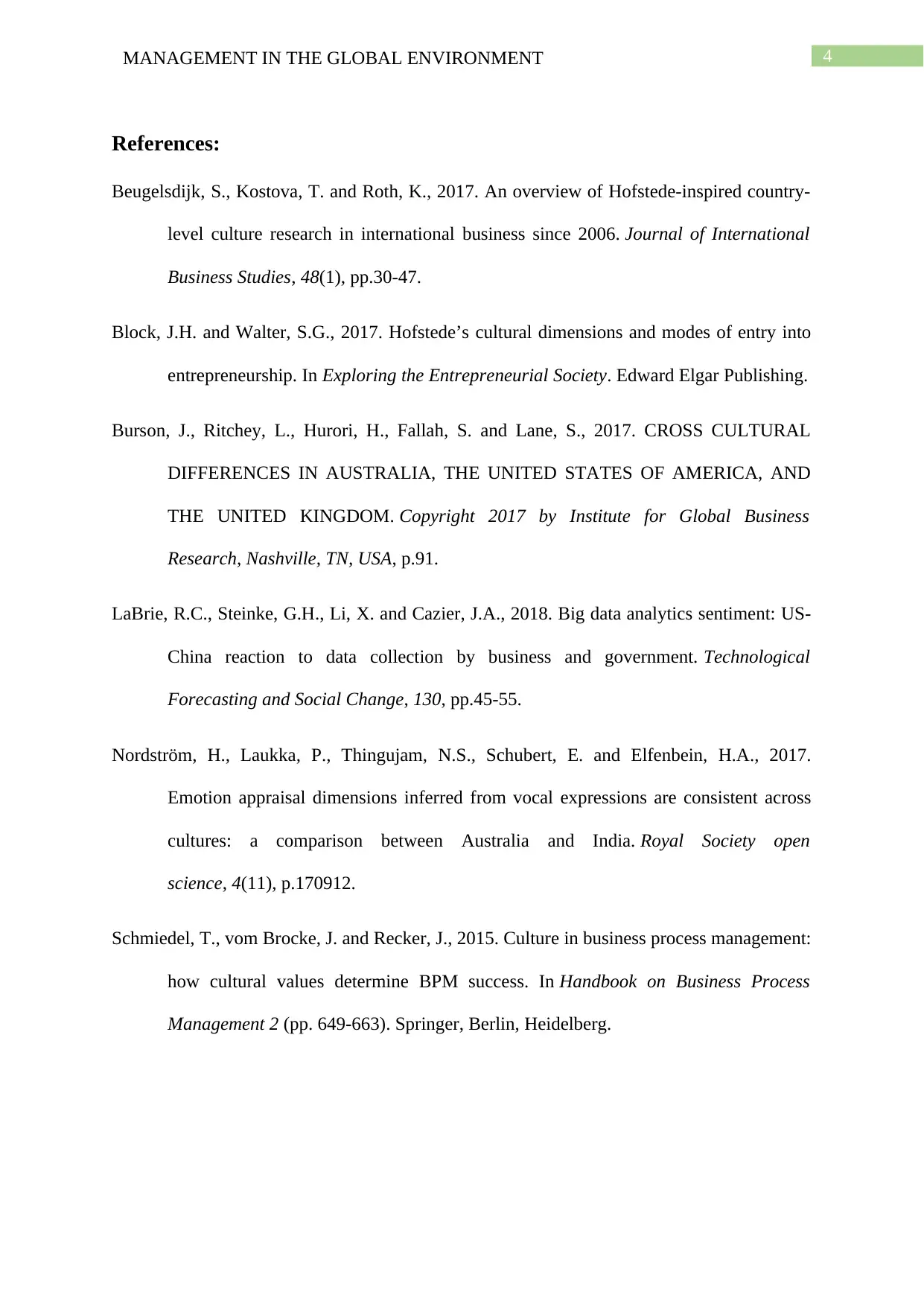
4MANAGEMENT IN THE GLOBAL ENVIRONMENT
References:
Beugelsdijk, S., Kostova, T. and Roth, K., 2017. An overview of Hofstede-inspired country-
level culture research in international business since 2006. Journal of International
Business Studies, 48(1), pp.30-47.
Block, J.H. and Walter, S.G., 2017. Hofstede’s cultural dimensions and modes of entry into
entrepreneurship. In Exploring the Entrepreneurial Society. Edward Elgar Publishing.
Burson, J., Ritchey, L., Hurori, H., Fallah, S. and Lane, S., 2017. CROSS CULTURAL
DIFFERENCES IN AUSTRALIA, THE UNITED STATES OF AMERICA, AND
THE UNITED KINGDOM. Copyright 2017 by Institute for Global Business
Research, Nashville, TN, USA, p.91.
LaBrie, R.C., Steinke, G.H., Li, X. and Cazier, J.A., 2018. Big data analytics sentiment: US-
China reaction to data collection by business and government. Technological
Forecasting and Social Change, 130, pp.45-55.
Nordström, H., Laukka, P., Thingujam, N.S., Schubert, E. and Elfenbein, H.A., 2017.
Emotion appraisal dimensions inferred from vocal expressions are consistent across
cultures: a comparison between Australia and India. Royal Society open
science, 4(11), p.170912.
Schmiedel, T., vom Brocke, J. and Recker, J., 2015. Culture in business process management:
how cultural values determine BPM success. In Handbook on Business Process
Management 2 (pp. 649-663). Springer, Berlin, Heidelberg.
References:
Beugelsdijk, S., Kostova, T. and Roth, K., 2017. An overview of Hofstede-inspired country-
level culture research in international business since 2006. Journal of International
Business Studies, 48(1), pp.30-47.
Block, J.H. and Walter, S.G., 2017. Hofstede’s cultural dimensions and modes of entry into
entrepreneurship. In Exploring the Entrepreneurial Society. Edward Elgar Publishing.
Burson, J., Ritchey, L., Hurori, H., Fallah, S. and Lane, S., 2017. CROSS CULTURAL
DIFFERENCES IN AUSTRALIA, THE UNITED STATES OF AMERICA, AND
THE UNITED KINGDOM. Copyright 2017 by Institute for Global Business
Research, Nashville, TN, USA, p.91.
LaBrie, R.C., Steinke, G.H., Li, X. and Cazier, J.A., 2018. Big data analytics sentiment: US-
China reaction to data collection by business and government. Technological
Forecasting and Social Change, 130, pp.45-55.
Nordström, H., Laukka, P., Thingujam, N.S., Schubert, E. and Elfenbein, H.A., 2017.
Emotion appraisal dimensions inferred from vocal expressions are consistent across
cultures: a comparison between Australia and India. Royal Society open
science, 4(11), p.170912.
Schmiedel, T., vom Brocke, J. and Recker, J., 2015. Culture in business process management:
how cultural values determine BPM success. In Handbook on Business Process
Management 2 (pp. 649-663). Springer, Berlin, Heidelberg.
1 out of 5
Related Documents
Your All-in-One AI-Powered Toolkit for Academic Success.
+13062052269
info@desklib.com
Available 24*7 on WhatsApp / Email
![[object Object]](/_next/static/media/star-bottom.7253800d.svg)
Unlock your academic potential
Copyright © 2020–2026 A2Z Services. All Rights Reserved. Developed and managed by ZUCOL.




